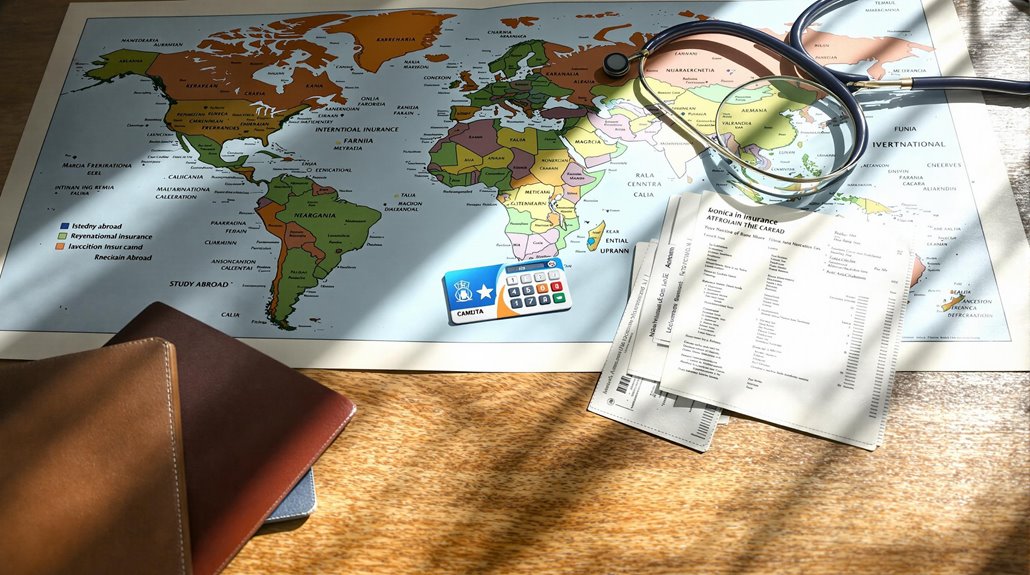To calculate your study abroad semester costs, start by adding core expenses: program tuition ($7,000-$22,000), housing ($4,000-$13,000), and travel costs ($900-$2,000). Then, factor in visa fees ($200-$500), health insurance ($210-$630), and daily living expenses. Don't forget to budget for cultural activities ($200-300 monthly) and set aside 10-15% for emergencies. These initial figures will help you plan, but there's much more to contemplate for a complete financial picture.
- Program Tuition and Academic Fees
- Housing and Living Arrangements
- Travel and Transportation Expenses
- Visa and Documentation Costs
- Health Insurance and Medical Requirements
- Daily Living Expenses and Currency Exchange
- Communication and Technology Costs
- Entertainment and Cultural Activities
- Emergency Fund Planning
- The Last Word
Program Tuition and Academic Fees

The financial landscape of study abroad programs can feel like traversing a complex maze, with program tuition and academic fees serving as your first major checkpoint.
Navigating study abroad costs feels like solving a financial puzzle, where tuition and fees are just the first piece.
You'll find semester tuition costs typically range from $7,000 to $22,000, though some programs, like Syracuse University's Wroclaw program, can reach upwards of $31,855.
If you're looking at CIEE programs, you're generally looking at $19,850, but don't forget to factor in regional variations.
Europe tends to be pricier at $20,950, while Latin America offers more budget-friendly options around $17,950.
For the penny-pinchers among you, direct enrollment programs like University of Louisville's Madrid program can be a steal, especially for in-state students at $5,942.
Just remember to account for those sneaky transcript fees, which can add another $500 to your tab.
For students considering Australia, be prepared for higher costs as it ranks as the most expensive destination for international study programs.
Housing and Living Arrangements
With program costs mapped out, let's look at where you'll rest your head during your international adventure.
Housing expenses can vary dramatically based on your destination, with European cities like Berlin offering more budget-friendly options ($6,115-$9,715 per semester) compared to pricier locations like London ($7,159-$12,989).
You'll want to carefully weigh your living arrangements, as location matters more than you might think – in the U.S., staying within half a mile of campus can cost nearly twice as much as living just two miles away. The current affordable housing shortage in many popular study destinations makes early planning crucial.
Students in London can reduce costs by choosing student accommodation in outer zones while utilizing public transport. Consider alternative options like homestays in Paris ($4,153-$4,604) or shared rooms in purpose-built student housing to maximize your budget.
Don't forget to factor in meal plans, which can range from $2,300 in Berlin to $2,800 in Florence.
Travel and Transportation Expenses

Planning your travel budget carefully will make or break your study abroad experience, starting with airfare that typically ranges from $900 to $1,300 for semester programs.
If you're heading to Asia-Pacific, expect to pay upwards of $2,000 for those long-haul flights, while European routes tend to be more budget-friendly. Building an emergency travel fund of at least $500 can protect you from unexpected travel disruptions.
Don't forget about your daily commute costs! You'll need to budget $50-$150 for monthly public transit passes, and it's smart to set aside $10-$30 daily for those late-night taxi rides.
If you're dreaming of exploring like a local, consider renting a bicycle – it'll cost you around $300-$500 for the semester in Europe.
Remember that weekend wanderlust, too – those spontaneous trips to neighboring cities can add another $500-$1,000 to your travel expenses. Your travel costs may vary significantly depending on your destination, with programs in Latin America costing less than other regions.
Visa and Documentation Costs
Securing necessary visas and documentation represents one of the most critical steps in your study abroad journey, typically costing between $200-$500 for basic visa applications, with additional fees that can push your total documentation expenses well above $1,000.
You'll need to factor in several country-specific requirements, such as document authentication ($100-$500), translation services ($50-$200), and mandatory pre-departure orientations ($100-$300).
Don't forget about those pesky administrative costs, including program documentation processing ($75-$375) and housing verification fees ($100-$300).
If you're heading to Europe's Schengen Zone, you'll also need to budget for travel insurance proof (€50-€120).
While these costs might make your wallet wince, they're non-negotiable parts of your study abroad experience.
Students planning to study in popular destinations in Europe, like Italy, Spain, and the United Kingdom, may face higher documentation fees due to increased demand and stricter requirements.
Health Insurance and Medical Requirements

Protecting your health while studying abroad requires extensive medical insurance coverage, which typically ranges from $210 to $630 per academic program.
You'll need to verify that your plan meets the minimum coverage requirements of $500,000+, including medical evacuation and repatriation benefits. WorldTrips StudentSecure Plan provides ideal coverage for both US and international students. Don't forget to disclose any pre-existing conditions, or you might face claim denials later.
Always disclose pre-existing conditions and ensure your study abroad coverage exceeds $500,000 to avoid costly claim rejections.
When comparing insurance options, you'll want to weigh deductibles ($250-$500) and coinsurance rates (10-30%).
Many students opt for dual coverage to guarantee seamless care both abroad and back home. Remember, you'll need to carry your insurance ID card while traveling, and it's smart to check if your provider has a solid network of medical facilities in your host country.
Daily Living Expenses and Currency Exchange
Beyond securing your health coverage, your daily budget will shape the quality of your study abroad experience.
You'll need to factor in considerable cost variations between urban and suburban areas, with cities like London and New York running 20-30% higher than surrounding regions.
For groceries, expect to spend $400-600 monthly in the US, while eating out can cost $7-15 per meal. You'll save considerably by cooking at home and using student meal plans. Students should note that dining out in places like London can cost £20-30 per meal. Student meal plans in Scotland can help reduce food expenses by up to 25%.
When handling currency exchange, opt for services like Wise to avoid hefty bank fees that cost international students billions annually.
Consider opening a multi-currency account to manage your expenses across different currencies without markup.
Don't forget to build in a 10-15% contingency fund for emergencies and unexpected costs.
Communication and Technology Costs

When planning your study abroad technology budget, you'll need to account for essential communication costs that programs don't always cover in their fees.
While institutions like Fordham and Georgia Tech include some tech resources in their program fees ($2,450-$2,500), you'll still need to budget for personal devices and data plans.
Remember, even if your home carrier offers international coverage, you might face additional charges for data roaming or device insurance abroad.
Consider downloading essential mobile apps for translation and navigation to help manage daily communication needs while studying overseas.
Don't assume your program's technology fees cover everything – you'll likely need to factor in costs for mobile apps, GPS navigation, and potential tech support. Your program's technology fee of $1,761 covers basic institutional services, but personal tech expenses are separate.
While some programs include transit passes that reduce your reliance on navigation apps, it's smart to set aside funds for unexpected tech expenses and emergency communication needs.
Entertainment and Cultural Activities
Your study abroad experience won't be complete without exploring the local culture and entertainment scene, which can take a significant bite out of your budget.
You'll find entertainment costs vary dramatically by region, from $500 monthly in the Balkans to a hefty $1,500 in Nordic countries. In most European cities, you'll spend about $200-300 monthly on cultural activities. Financial planning is essential to ensure you can fully participate in cultural experiences.
To stretch your entertainment budget, take advantage of student discounts and university-organized excursions. Museum passes ($15-30) and cultural bundles (€20-50) offer great value, while theater performances ($30-100) and guided tours ($40-80) require careful planning. Many countries offering tuition-free education also provide discounted cultural activities for international students.
Consider setting aside 30% of your monthly budget for planned activities and 10% for unexpected opportunities. Don't forget to check if your program includes group dinners or cultural excursions – these freebies can save you serious cash!
Emergency Fund Planning

While studying abroad offers exciting opportunities, preparing for unexpected challenges requires a well-planned emergency fund. You'll want to set aside 10-15% of your total study abroad budget for emergencies, keeping it in a separate "untouchable" account.
Set aside 10-15% of your study abroad budget in a separate emergency fund to handle unexpected challenges while overseas.
Factor in potential health insurance gaps, visa renewal fees ($500-$1,000), and at least three months' worth of living expenses. Financial literacy workshops available through your campus can help you make informed decisions about managing your emergency fund.
To build your emergency fund, track your monthly spending patterns, automate savings transfers, and cut back on non-essentials like daily café visits. Creating a detailed monthly budget plan can help you identify areas where you can reduce expenses and maximize savings.
If you're facing financial strain, explore part-time work options (10-15 hours/week) or teaching assistantships.
The Last Word
You've now got the tools to plan, budget, and prepare for your transformative study abroad experience. By calculating program fees, living costs, and unexpected expenses, you'll avoid financial surprises and focus on what matters most: enjoying a new culture, making lifelong connections, and growing personally. Remember, while studying abroad isn't cheap, it's an investment in your future that'll enrich your life, expand your horizons, and create priceless memories.

